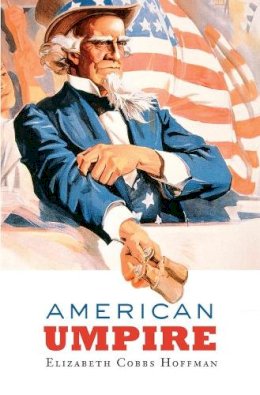
American Umpire
Elizabeth Cobbs Hoffman
Commentators frequently call the United States an empire: occasionally a benign empire, sometimes an empire in denial, and often a destructive empire. Elizabeth Cobbs Hoffman asserts instead that, because of its unusual federal structure, America has performed the role of umpire since 1776, compelling adherence to rules that gradually earned collective approval.
This provocative reinterpretation traces America’s role in the world from the days of George Washington, Abraham Lincoln, and Franklin D. Roosevelt to the present. Cobbs Hoffman argues that the United States has been the pivot of a transformation that began outside its borders and before its founding, in which nation-states replaced the empires that had dominated history. The “Western” values that America is often accused of imposing were, in fact, the result of this global shift. American Umpire explores the rise of three values—access to opportunity, arbitration of disputes, and transparency in government and business—and finds that the United States is distinctive not in its embrace of these practices but in its willingness to persuade and even coerce others to comply. But America’s leadership is problematic as well as potent. The nation has both upheld and violated the rules. Taking sides in explosive disputes imposes significant financial and psychic costs. By definition, umpires cannot win.
American Umpire offers a powerful new framework for reassessing the country’s role over the past 250 years. Amid urgent questions about future choices, this book asks who, if not the United States, might enforce these new rules of world order?
Product Details
About Elizabeth Cobbs Hoffman
Reviews for American Umpire
J. Simon Rofe
Times Higher Education
A useful, cogent examination of why, despite some folly and ill judgment, America continues to be the one country the world looks to when in crisis or need of support.
Kirkus Reviews
In this bold revision of the history of American foreign policy, Stanford historian Cobbs Hoffman upends the notion that the U.S. was ever an empire, arguing instead that democratic capitalism, in which the people are sovereign and individuals own and generate wealth, essentially sells (and is selling) itself.
Publishers Weekly
American Umpire is the most persuasive and sensible one-volume interpretation of the whole history of American foreign policy to appear in at least a generation.
Philip Zelikow, University of Virginia American Umpire is startlingly original, a fascinating interpretation of the history of the United States in the world.
Erez Manela, coeditor of The Shock of the Global: The 1970s in Perspective Are we really exceptional? Have we really improved the world through our foreign activities? Elizabeth Cobbs Hoffman offers a resounding yes to both questions. With insight and wit, she explains how Americans have helped to build more open, accountable, and peaceful societies across the globe.
Jeremi Suri, author of Liberty’s Surest Guardian: American Nation-Building from the Founders to Obama Few ideas about world politics seem more popular than the notion that the United States, still the world’s great superpower, has formed its own form of empire. This is the notion that Elizabeth Cobbs Hoffman challenges in this fast-paced, always provocative, and certainly controversial interpretation of America’s global role.
Jack N. Rakove, author of Revolutionaries: A New History of the Invention of America
